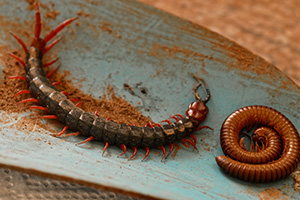Centipede and Millipede Season in Georgia
Serving Atlanta Metro | Columbus | Augusta | Savannah
 As nocturnal pests, centipedes and millipedes like to make their homes in moist, dark areas such as underneath landscaping rocks, logs, and piles of leaves. So homeowners in Georgia might notice an increase in sightings of these creatures as the seasons change.
As nocturnal pests, centipedes and millipedes like to make their homes in moist, dark areas such as underneath landscaping rocks, logs, and piles of leaves. So homeowners in Georgia might notice an increase in sightings of these creatures as the seasons change.
While they may look like insects, centipedes and millipedes are actually closer in relation to lobsters, shrimp, and crayfish. But either way, they are treated like pests when it comes to extermination. These multi-legged creatures can be a nuisance indoors and outdoors, so understanding their seasonal patterns, activity levels, and how to manage their presence is essential for maintaining a comfortable home environment.
What Season Do You See House Centipedes and Millipedes?
Centipedes and millipedes are typically more noticeable from early spring through late summer. Spring and summer are prime seasons for many pests including house centipedes and millipedes – as they thrive in the increased humidity and warmth. During these seasons, homeowners might find them in basements, bathrooms, and other damp areas inside their homes.
Millipedes spend most of their lives in the soil, where they overwinter before laying eggs in the spring. Sometimes millipedes migrate in large numbers, especially after heavy rains in late summer or when the weather cools.
House centipede development is slower, but relatively long-lived. They also overwinter as adults and lay their eggs in the soil during the spring and summer.
So as temperatures rise, these arthropods become more active and seek out environments with higher moisture levels. Warm temperatures and sufficient humidity provide an ideal environment for centipedes and millipedes to thrive. During this time, they are frequently found in gardens, under rocks, in leaf litter, and within the dark, damp corners of homes.
Need an Estimate for Seasonal Pest Control?
Are Centipedes and Millipedes in Georgia Venomous?
Not really – house centipedes in Georgia do possess venomous fangs used to subdue their prey, but their venom is not strong enough to be venomous or pose a significant threat to people. Bites from house centipedes are rare and typically result in minor irritation similar to a bee sting.
Millipedes are also not really venomous, and some species have glands that produce irritating fluids, which may cause allergic reactions in some individuals. The defensive sprays of certain millipedes contain hydrochloric acid that can burn the skin and cause long-term discoloration. These fluids can also be harmful to the eyes, so it’s best not to handle millipedes with bare hands.
It’s also important to note that millipedes and centipedes don’t carry diseases that harm people, animals, or plants. While the sight of centipedes and millipedes can be alarming, it’s important to note that these creatures are generally not harmful to humans.
How Do I Get Rid of Centipedes and Millipedes?
Getting rid of centipedes and millipedes involves a combination of preventive measures and targeted treatments. Here are some practical steps to manage their presence:
- Reduce moisture. Address any moisture issues in your home, such as leaky pipes, poor ventilation, and damp areas. You can use dehumidifiers in basements and bathrooms to create a less hospitable environment for these pests.
- Seal entry points. Inspect your home for cracks, gaps, and openings that centipedes and millipedes can use to enter. Seal these entry points with caulk or weatherstripping to prevent infestations.
- Remove debris. Keep your property free of leaf litter, mulch, and other organic debris where centipedes and millipedes can hide. Trim overgrown vegetation and ensure proper drainage to reduce outdoor habitats.
- Call professional pest control. Consider enlisting the help of a professional pest control service. They can provide targeted treatments to eliminate existing infestations and implement preventive measures to reduce pests in your home.
If you face a centipede or millipede infestation, you’ll want to get rid of them fast. The easiest, most effective way to do this is to let the professionals handle things. The expert pest control technicians at Active Pest Control use a combination of exclusion techniques, pest removal, and insecticide applications to eliminate pests from your home or business.
Rely on the Centipede and Millipede Control Experts in Georgia
Centipedes and millipedes love Georgia for its moist climate. As a resident, you may experience this kind of infestation – which means that it’s a good idea to know what to look for and how to respond during the right season. Instead of attempting to tackle an infestation by yourself, your best bet is to contact a trusted pest removal company. Active Pest Control’s pest professionals are more than happy to perform centipede and millipede control!
Don’t let centipedes and millipedes disrupt your peace of mind. Contact us today to schedule a comprehensive pest control inspection and keep your home comfortable all year round.
Back to Seasonal Pest Control Services